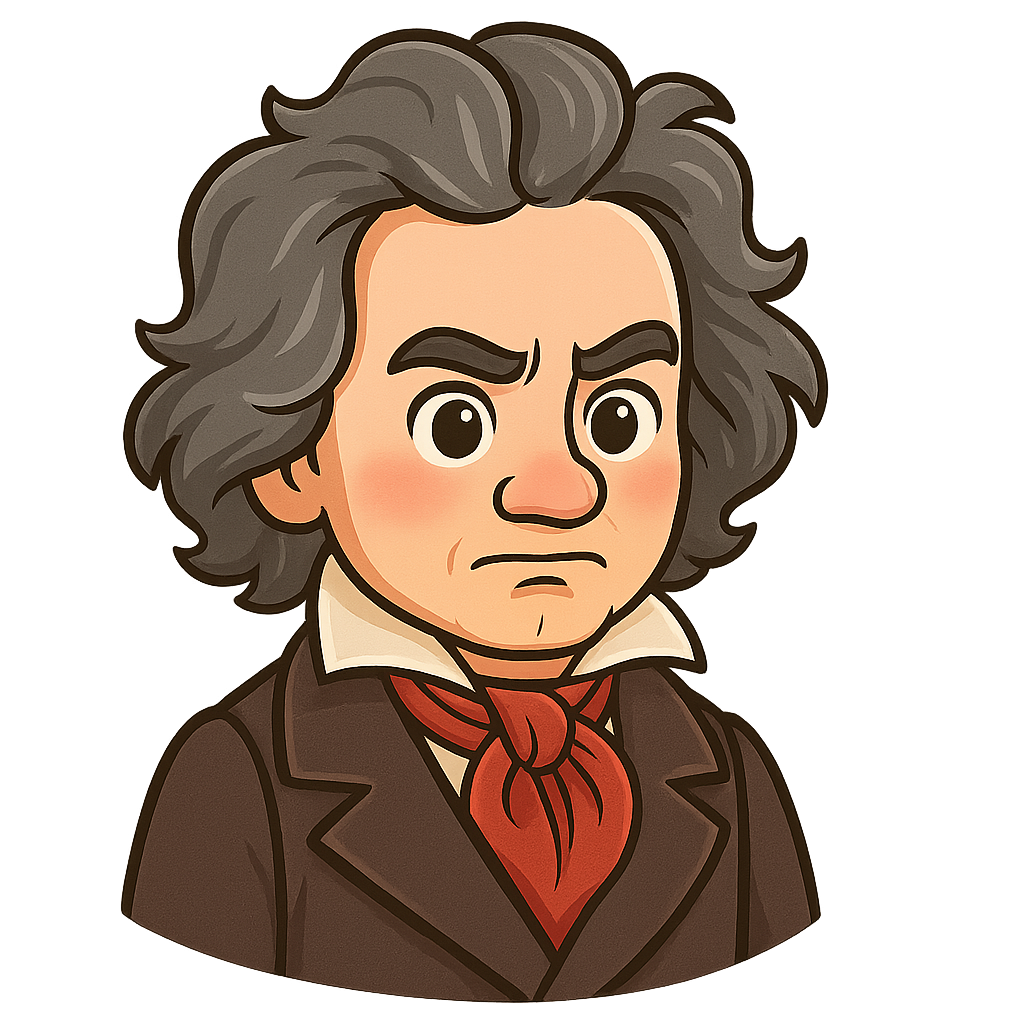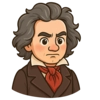The Story of Ludwig van Beethoven
Hello. My name is Ludwig van Beethoven, and I want to tell you the story of my life, a life filled with music, struggle, and joy. I was born in a small city called Bonn, Germany, way back in December of 1770. My world was music from the very beginning. My father, Johann, was a singer and my first music teacher. He saw talent in me and dreamed I would become the next Wolfgang Amadeus Mozart. But his lessons were harsh, and he would often wake me late at night to practice the piano until my fingers ached. Despite his strictness, my love for music grew stronger every day. It was a language I understood better than words. I gave my first public concert when I was only seven years old, in 1778. Even then, as a small boy playing for an audience, I felt a powerful force inside me. I knew my destiny was not in Bonn. My heart was pulled toward a magical city I had only heard stories about: Vienna, the musical capital of the world. It was where the greatest composers lived and worked, and I knew, with every note I played, that I had to be there.
In 1792, at the age of 21, I finally packed my bags and traveled to Vienna to chase my dream. The city was everything I had imagined—alive with art, culture, and most importantly, music. I was fortunate enough to study with the great composer Joseph Haydn. He was a master, but I was a restless and rebellious student. I wanted to break the rules of music, not just follow them. Soon, I began to make a name for myself in the grand homes of the Viennese nobility, not just as a composer, but as a piano virtuoso. My performances were not like the polite, delicate playing people were used to. I played with a fire and passion that shocked them. I would improvise on the spot, creating wild, thundering music that came directly from my soul. People said they had never heard anything like it. This was a happy time for me. Success felt wonderful, and I poured my feelings into my compositions. It was during these early years in Vienna that I wrote some of my most famous piano sonatas, like the “Pathétique” Sonata, full of drama and deep emotion that I felt so strongly in my heart.
Just as my career was reaching its peak, a shadow began to fall over my life. Around 1798, I started to notice a frightening sound in my ears—a constant buzzing and humming that would not go away. At first, I tried to ignore it, but the sounds grew louder, and the beautiful, clear notes of music began to fade. I, a musician, was losing my hearing. I cannot describe the terror and despair I felt. How could a composer create music if he could not hear it? I was so ashamed and frightened that I kept it a secret from everyone. I avoided conversations and social gatherings, afraid someone would discover my condition. My loneliness was a heavy cloak. By 1802, my despair became so great that I retreated to a quiet village outside Vienna called Heiligenstadt. There, I wrote a long, secret letter to my brothers, pouring out all my sadness and anger. I thought my life was over. But as I wrote, something inside me shifted. I realized that I had so much music still inside me, waiting to be shared with the world. I could not let deafness silence me. I made a promise to myself to live for my art.
That decision changed everything. My deafness, which I thought was a curse, became the very thing that transformed my music. Since I could no longer hear the world outside, I turned inward and began to compose with the music I heard in my mind and felt in my heart. The sounds in my imagination were more powerful and emotional than any I had heard with my ears. This marked the beginning of what people now call my 'Heroic Period.' I stopped writing music to please aristocrats in their drawing rooms; I started writing music to express the great struggles and triumphs of the human spirit. In 1804, I completed my Third Symphony. I called it 'Eroica,' which means 'heroic,' and I dedicated it to a man I believed was a true hero of the people, Napoleon Bonaparte. But when I learned that he had crowned himself emperor, I flew into a rage. He was no hero, just another tyrant. I scratched his name from my manuscript so fiercely that I tore a hole in the paper. My music would not honor a man like that. During this time, I also wrote my only opera, 'Fidelio,' a story about a brave woman who risks everything to rescue her husband from a political prison. It was a story of freedom and love conquering injustice, themes that now burned brightly in my soul.
In my later years, the silence became almost complete. I could barely hear a cannon blast, let alone a delicate note from a violin. I communicated with friends using conversation books, where they would write down their words for me to read. Yet, it was in this profound silence that I composed some of my greatest masterpieces. My mind was a universe of sound. The culmination of my life's work came in 1824 with the premiere of my Ninth Symphony. It was a massive, revolutionary piece of music, longer and grander than any symphony before it, and for the first time ever, it included a choir of singers. The final part set a poem to music called 'Ode to Joy,' a powerful call for all of humanity to live together in peace and harmony. I stood on the stage to help conduct, but I was so lost in the music in my head that I couldn't hear the orchestra or the audience. When the final note faded, I was still conducting. One of the young singers gently had to turn me around to face the crowd. I saw a sea of people on their feet, waving handkerchiefs and hats in the air. I could not hear their thunderous applause, but I could see their joy. Three years later, in 1827, my long and difficult journey came to an end. But my music never did. It has lived on, carrying a message that even in the face of the deepest silence and struggle, the human spirit can create something powerful, beautiful, and full of unbreakable joy.
Reading Comprehension Questions
Click to see answer



